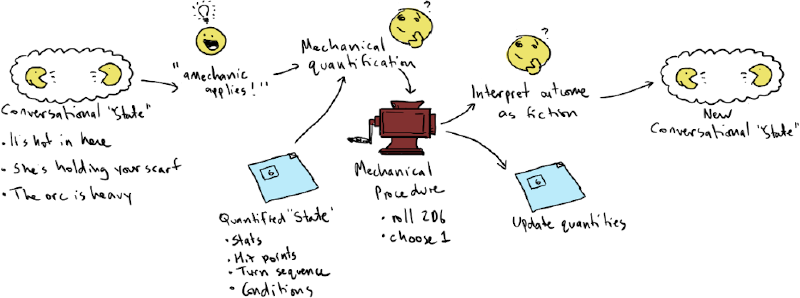I see this come up quite a bit when a game is referred to as “fiction first”:
Aren’t all RPGs fiction first?
And the thing is…they’re right. Any RPG can be played as fiction first because every RPG has a fiction layer.
And if that’s the case, what would disqualify an RPG as being fiction first?
At some point, it became a common belief that all of a game’s mechanics needed to be connected to the fiction for a game to be considered fiction first. The problem is that there’s no support for that, even among games that most people point to as examples. There are moves in Apocalypse World, and many PbtA games, that aren’t triggered by the fiction (Vincent Baker even says as much). Similarly, Blades in the Dark has mechanics that aren’t necessarily triggered by or dependent on the fiction.
So Then, What Isn’t Fiction First?
Like many things regarding RPGS, fiction first is a spectrum versus a dichotomy. Most games will have rules or processes that are more fiction first than others, and some that aren’t at all. What makes me consider one game to be more fiction first than another game is how seamlessly play can move the conversation from pure fiction to the mechanics and back again. In some games — GURPS, HERO, and Storyteller are examples for me — there is always a “record scratch” moment when we have to engage the mechanics. It’s a lot like pulling the emergency brake on a train. In extreme cases, the mechanics actively work against or contradict the established fiction.
I have an image illustrating how I view this flow between fiction and mechanics. I downloaded it from, I believe, a thread on Vincent Baker’s blog, but I’ve lost the exact source, and Vincent doesn’t know either. It may have been created by Ben Lehman, the creator of Polaris and Bliss Stage. It’s the header image of this post, but here is the full image:

Any mechanics that interject or otherwise cause friction in that transition from conversation to rules aren’t fiction first to me. Whether they are grounded in the fiction or connect back to it directly isn’t a factor. Even “disconnected” mechanics can respect the integration between conversation and fiction and won’t contradict the existing fiction.
An example of one of those contradictions is random hit locations. Suppose a character is swinging a sword at another character in a tree. In that case, any result from the hit location chart that isn’t feet or legs brings the whole thing to a screeching halt. Rolemasters crit and fumble tables also come to mind. To me, these things aren’t only not fiction first, they’re anti-fiction. The same goes for rolling a “crit” but then rolling very little damage.
To be clear, it’s not the existence of hit locations or crits that I have a problem with — so long as they don’t trample on the existing fiction. There’s nothing wrong with the games I mentioned, though I no longer enjoy them as much because of the disconnects.
I view entanglement rolls in Blades in the Dark as fiction first (or at least adjacent). The die rolls may add to the fiction, but don’t contradict it. Blades in the Dark’s actions, or Fate Accelerated’s approaches, are solidly fiction first. Not only are the inputs grounded in the fiction (your chosen action or approach is what your character is actually doing or how they are doing it), but the results are output for determining the final fictional state. The mechanics don’t try to shoulder their way in. The same goes for hitches, opportunities, and complications in Cortex Prime.
All About The Friction
The concept of “fiction first” isn’t a black-and-white issue. It is a spectrum defined by the friction between the established fiction and the mechanics and how smoothly play can transition between the conversation about the fiction to engaging with the rules. Fiction first RPGs should create an engaging experience where the mechanics enhance the fiction, not contradict it.
